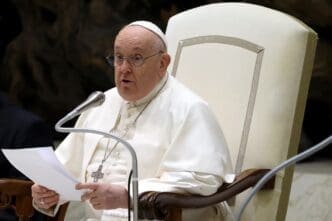Pope Francis, born Jorge Mario Bergoglio on December 17, 1936, in Buenos Aires, Argentina, passed away on Monday, marking the end of a transformative era for the Catholic Church. As the first pope from the Americas and a member of the Jesuit order, Francis brought a unique perspective to the papacy.
Francis was born to Italian immigrants, the eldest of five siblings. He was ordained a Jesuit priest in 1969, later leading the religious order in Argentina during the country’s dictatorship from 1976 to 1983. In 1998, he became the Archbishop of Buenos Aires and was elevated to cardinal in 2001. His election as the 266th pope took place on March 13, 2013.
Noteworthy Firsts
- First pope from the Americas.
- First Jesuit pope.
- First to take the name Francis, in honor of St. Francis of Assisi.
- First pope to visit Iraq, meeting its top Shiite Muslim cleric in 2021.
Commitment to Humility and Simplicity
As Archbishop of Buenos Aires, Francis was known for his humble lifestyle. He opted for public transportation, prepared his own meals, and frequently visited impoverished areas. His simplicity continued as pope, living in the Vatican guesthouse instead of the Apostolic Palace and using modest vehicles. His choice of the name Francis reflected his dedication to simplicity and humility.
Advocate for Migrants
One of Francis’ key priorities was advocating for migrants. His first trip outside Rome in 2013 was to Lampedusa, where he met with newly arrived migrants and condemned global indifference to their plight. In 2016, he prayed for migrants at the U.S.-Mexico border and brought Syrian refugees to Rome after visiting a camp in Greece. His stance often clashed with U.S. and European immigration policies.
Progressive LGBTQ+ Approach
Early in his papacy, Francis adopted a more welcoming approach towards LGBTQ+ individuals. He famously remarked, “Who am I to judge?” regarding a gay priest. In 2023, he stated that being homosexual is not a crime and endorsed blessings for same-sex couples, provided they did not mirror marriage vows.
Environmental Initiatives
Francis was a pioneering pope in emphasizing environmental care, utilizing scientific data in his teachings. His 2015 encyclical “Praised Be” called for a cultural revolution to address economic systems exploiting the poor and harming the Earth. He continued the church’s tradition of advocating for environmental responsibility.
Handling of Clergy Sexual Abuse
The papacy faced its biggest scandal in 2018 when Francis initially sided with a Chilean bishop accused of covering up sexual abuse. Acknowledging his mistake, he invited victims to the Vatican and personally apologized, also urging the resignation of the entire Chilean bishops’ conference. In 2019, he convened a summit on abuse and introduced new church laws to address such cases. However, his decisions in some high-profile cases faced criticism.
Facing Criticism
Francis’ reform agenda often encountered opposition, especially with the presence of Pope Emeritus Benedict XVI. Critics labeled him a heretic after his 2016 decision on Communion for divorced and remarried Catholics. In 2018, Archbishop Carlo Maria Vigano accused church officials of covering up misconduct, demanding Francis’ resignation. Vigano’s continued criticisms led to his excommunication in 2024 for schism.








